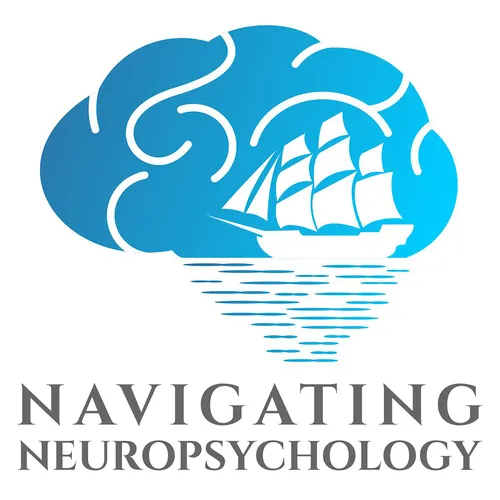
Navigating Neuropsychology
Join John and Ryan as they explore the field of neuropsychology through the presentation of cutting edge scientific findings, discussion of important topic areas, and interviews with experts in a variety of relevant fields. The three main objectives of the podcast are to
1) Provide interesting, relevant, and easily-accessible information for students and professionals in neuropsychology, as well as anyone who is interested in brain-behavior relationships.
2) Begin working towards unification on important areas of debate within neuropsychology, while also encouraging the expression of diverse, creative ideas and opinions.
3) Act as an outlet for innovative ideas and breaking news in the field, to allow listeners to stay abreast of current scientific and professional developments in neuropsychology.
Check out www.NavNeuro.com for more information about the show.
- Update frequency
- every 15 days
- Average duration
- 60 minutes
- Episodes
- 174
- Years Active
- 2018 - 2025

14| Neuropsychology for Non-Neuropsychologists (Part 2)
We provided an overview of the field of neuropsychology in Episode 2, but we wanted to run it by someone outside the field to see if anything was unclear or if other questions came up. This episode …

13| Disclosing Alzheimer’s Disease Genetic Risk – A Conversation With Dr. Meghan Collier
Clinical trials in Alzheimer’s disease frequently include the measurement of risk genes (i.e., the APOE e4 allele), and advancements in direct-to-consumer genetic testing (e.g., 23andMe) have made th…

12| Inside NavNeuro: University of Florida ANST Q & A
We have a different kind of episode for you today. We were recently asked to speak about NavNeuro at an ANST brown bag lunch at the University of Florida. This episode is the audio from our Q & A w…

11| The Human Microbiome and Mental Illness: The Gut-Brain Axis – A Conversation With Dr. Tanya Nguyen
In our bodies, microbial genes outnumber human genes by about 100 to 1. The human microbiome (the bacteria, fungi, and viruses that live in us) has been linked to gastrointestinal diseases, immune f…

10| Caregiver Burden: Prevalence, Assessment, and Treatment – A Conversation With Dr. Geoff Tremont
A tremendous amount of stress and anxiety is experienced by caregivers of older adults with dementia. Caregivers often endure both psychological and medical illnesses and there are significant barri…

09| Electrical Injuries: Cognitive and Emotional Sequelae – A Conversation With Dr. Neil Pliskin
Electrical injuries often result in diffuse cognitive symptoms and mood changes. In this episode, we discuss the ins and outs of this unique injury with Dr. Neil Pliskin (former president of APA Div…

08| Nailed it! Advice for Internship and Postdoc Interviews
John and Ryan recently went through the process of interviewing for pre-doctoral internship and postdoctoral fellowship, and they have lots of ideas and advice to share about their experiences. This…

07| Driving Assessment and Management in Older Adults with Cognitive Impairment – A Conversation With Dr. Jenn Davis
Older adults are at greater risk for unsafe driving, due in large part to the increased risk for pathological cognitive decline. Neuropsychologists frequently address driving safety in their clinical…

06| Pediatric Cancer: The Role of a Neuropsychologist – A Conversation With Dr. Christine Trask (Part 2)
In Part 2, we continue our discussion about childhood cancer with Dr. Christine Trask. We talk about the ins and outs of testing, the impact of neuroplasticity, academic effects of symptoms and trea…

05| Pediatric Cancer: The Role of a Neuropsychologist – A Conversation With Dr. Christine Trask (Part 1)
An introduction to the role of a neuropsychologist in assessing children with cancer, with Christine Trask, Ph.D., ABPP-CN. Christine walks us through essential concepts in the biology of cancer, pro…

04| Neuroimaging and Neuropsychology, Friends or Foes? – A Conversation With Dr. Steve Correia (Part 2)
Join us for a conceptual conversation with Dr. Steve Correia, a board-certified neuropsychologist with extensive neuroimaging experience. We talk about how to increase your skill in interpreting brai…

03| Neuroimaging and Neuropsychology, Friends or Foes? – A Conversation With Dr. Steve Correia (Part 1)
We interviewed Stephen Correia, Ph.D., ABPP-CN, a neuropsychologist with extensive research and clinical training in the use of imaging techniques. In this week’s episode, we cover the following con…

02| Neuropsychology for Non-Neuropsychologists – An Overview of the Field
This week’s episode is meant for non-neuropsychologists, but neuropsychologists and trainees might enjoy hearing how we introduce the field. We introduce and talk about what neuropsychology is and w…

01| Introducing Navigating Neuropsychology
Welcome to Navigating Neuropsychology (NavNeuro for short), a podcast for neuropsychology trainees, professionals, and anyone interested in the brain and behavior. This episode is an introduction to…